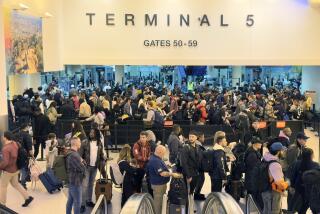Jet Fuel Costs, Not Fares, Falling
The drop in oil prices has made jet fuel the cheapest in more than a decade, but airlines have not passed savings on to consumers with lower fares, industry officials and analysts said Friday.
Major carriers, after a bumper year in 1997 aided by falling fuel prices, are en route to saving billions of dollars more this year since fuel prices have fallen further in early 1998.
Jet fuel, which typically accounts for about a quarter of airline costs, is at the cheapest level since July 1986, according to Oil Price Information Services. The price is even lower when inflation is taken into account.
“These low prices are great for the airline industry,” said David Swierenga, an economist with the Air Transport Assn. of America in Washington. “Every penny decline in the average price of jet fuel translates into $170 million in savings on an annual basis.”
Swierenga estimated the industry will save about $1.9 billion in 1998 if prices stay this low.
On Friday, crude for April delivery edged slightly higher to $14.32 a barrel, up from $14.30.
Stephen Klein, an analyst with Standard & Poor’s Equity Group, said a 15% drop in average jet fuel price this year “doesn’t seem unreasonable barring major international developments.”
Fuel costs are second only to labor costs for airlines, and the stocks of major airlines have been soaring as fuel prices sink.
“Airline stocks have fully recognized” lower jet fuel prices, Klein said.
However, in New York Stock Exchange trading Friday, shares of American Airlines parent AMR Corp. fell $2.56 to close at $139.81; shares of United Airlines parent UAL Corp. declined $1.75 to $89.88; Delta Air Lines Inc. shares lost $2.88 to $118.88; and Continental Airlines Inc. shares dropped 75 cents to $62.25.
But while AMR and UAL stock soared 40% or more last year, vacation travelers saw fares rise 3% on average, while business-class fliers swallowed a whopping 17% increase.
Officials of American and United were not available to comment.
Larry Kelner, chief financial officer at Continental Airlines, said the carrier sees “benefits of cheap jet fuel fairly quickly.” But he added, it was “hard to make a direct matchup” between jet fuel prices and ticket prices, he said.
“If the price of crude oil stays where it is today,” Kelner said, fuel would cost Continental about 50 cents a gallon this year, a 13-cent decline from last year.
A correlation between ticket prices and jet fuel exists, “but surely we are not planning that jet fuel prices are going to stay where they are,” he said.
A spokesman for a consumer travel group said low jet fuel prices don’t necessarily mean falling fares.
“It’s possible that if there are prolonged lower jet fuel prices, ticket prices will decline relatively, but traditionally that is not the case,” said Steve Loucks, of the American Society of Travel Agents.
Loucks said recent increases in load factors, the percentage of seats filled, would probably keep the price of air travel high. Load factors through January and February rose 8% from strong levels a year earlier.
S&P;’s Klein said the “industry does not have much incentive to pass fuel savings to customers,” because fuller flights mean less incentive to cut prices.
“On some flights there are a shortage of seats,” he said.
More to Read
Inside the business of entertainment
The Wide Shot brings you news, analysis and insights on everything from streaming wars to production — and what it all means for the future.
You may occasionally receive promotional content from the Los Angeles Times.










